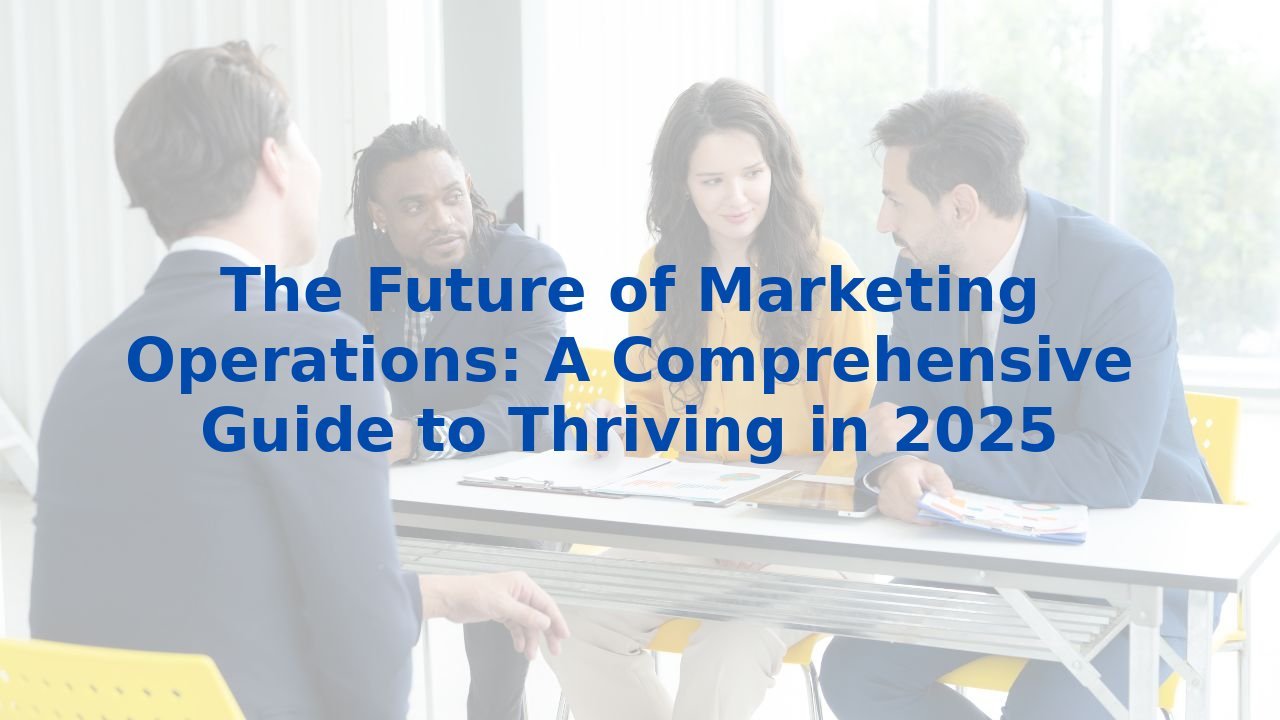The Future of Marketing Operations: A Comprehensive Guide to Thriving in 2025
The Future of Marketing Operations: A Comprehensive Guide to Thriving in 2025
As we look ahead to 2025, the landscape of marketing operations is poised for profound transformation. At the heart of this evolution lies the integration of Artificial Intelligence (AI), which not only streamlines processes but also reimagines how organizations engage with customers, analyze data, and strategize for future growth. In this post, we’ll explore how various business processes can be enhanced through AI, and why investing in employee training for AI is a smart move for any organization.
Automation of Repetitive Tasks
One of the most significant contributions of AI to marketing operations is its capability to automate repetitive tasks. Think about the multitude of activities marketing teams juggle daily—from data entry and lead scoring to managing social media posts and email campaigns. AI-powered tools can take over these tedious functions, allowing marketing professionals to channel their creativity and strategic thinking into higher-value activities.
When employees are freed from the grind of manual tasks, they have more time to innovate, strategize, and develop campaigns that resonate with their target audience. This shift not only enhances job satisfaction but also leads to campaigns that are more impactful and engaging.
Enhanced Decision-Making
With data proliferation at an unprecedented rate, making sense of this information can feel overwhelming. Here, AI shines, offering businesses the ability to process vast datasets quickly and accurately. Marketing teams can leverage AI tools to gain real-time insights into consumer behavior and market trends.
Imagine having the capability to analyze customer interactions on multiple platforms, predict future buying behavior, and tailor marketing messages accordingly. AI’s analytical prowess transforms data into actionable strategies, empowering marketing teams to optimize their decisions and anticipate market shifts. This can give organizations a competitive edge that is hard to achieve in the traditional landscape.
Improved Operational Efficiency
Efficiency is key to thriving in today's fast-paced business environment. By integrating AI into various aspects of marketing operations, companies can significantly reduce operational costs. For example, AI chatbots streamline customer service by handling inquiries around the clock, while predictive analytics can optimize ad spend by determining the best platforms and audiences to target.
The shift towards efficiency is not merely about cutting costs; it’s about reallocating resources to high-impact areas. This means investing more in innovative campaign strategies or enhanced customer experiences that truly resonate with consumers. The outcome? Marketing efforts that translate directly into increased customer loyalty and heightened brand awareness.
Customer Service and Support
In the age of immediacy, customer service expectations have skyrocketed. AI is redefining how brands engage with their customers, offering immediate responses through virtual assistants and chatbots that are available 24/7. This immediate access to help not only improves customer satisfaction but can also preemptively address issues before they escalate into complaints.
AI’s capability to analyze past consumer behavior allows businesses to anticipate needs and wants. Imagine being able to offer a customer an immediate solution to their problem based on their previous interactions before they even realize there is an issue. This proactive approach can significantly enhance the customer experience, fostering loyalty that goes beyond the transactional and builds lasting relationships.
Training Employees for AI
While the automation potential of AI is enormous, it’s essential to remember that technology alone doesn’t drive success. The human element remains irreplaceable. Hence, equipping employees with the knowledge and tools to work alongside AI is vital.
Training programs should focus not just on how to operate AI tools but also on how to interpret AI-generated insights and leverage them in strategic decision-making. By investing in ongoing AI training for employees, businesses cultivate a workforce that is agile, informed, and prepared to harness AI’s full potential. This, in turn, cultivates a culture of continuous improvement and adaptation, crucial in a world where change is the only constant.
Conclusion
As we stand on the brink of 2025, the future of marketing operations is undeniably intertwined with Artificial Intelligence. Organizations that embrace AI not only enhance their operational efficiency but also empower their teams to thrive in an increasingly complex landscape. By automating repetitive tasks, enhancing decision-making, and revolutionizing customer service, AI lays the groundwork for sustainable growth.
Ultimately, success lies in the balance between technology and human intuition. By committing to training employees to work effectively with AI, businesses can cultivate a vibrant ecosystem where innovation flourishes. As marketing operations continue to evolve, those prepared to adapt will undoubtedly emerge as the frontrunners of tomorrow’s business landscape.



